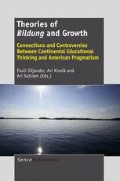Abstract
The discourse of pedagogical theory has traditionally appeared in a different manner in different cultural and linguistic areas and in different scientific traditions. Regardless of historical and thematic connections, different linguistic and cultural areas have given birth to their own specific vocabularies and genres of discussion, the coordination and transformation of which from one language to another or outside the genre in question may produce disconnection. Although development in recent decades and today’s ubiquitous ‘globalisation’ have broken previous barriers and dissolved differences between scientific traditions and linguistic and cultural areas, integration of representative models of thought in different genres or the finding of a common language is not always straightforward.
Access this chapter
Tax calculation will be finalised at checkout
Purchases are for personal use only
Preview
Unable to display preview. Download preview PDF.
References
Childs JL. American Pragmatism and Education. An Interpretation and Criticism. New York: Henry Holt and Company; 1956.
Cook GA. George Herbert Mead. The Making of a Social Pragmatist. Urbana and Chicago: University Illinois Press; 1993.
Cremin, L. A. (1964). The Transformation of the School. Progressivism in American Education 1876–1957. New York: Vintage Books.
Dewey, J. The Collected Works of John Dewey 1882–1953. The Electronic Version. J. A. Boydston (Ed.). MW6: 178–356. How We Think.
Dewey J. Democracy and Education. An Introduction to the Philosophy of Education. New York: The Macmillan Company; 1955.
Dews P. Disenschament. Esseys on Contemporary European Philosophy. London: Verso; 1995.
Downs H. Horace Mann. Champion of Public Schools. New York: Twayne Publishers, Inc.; 1974.
Dykhuizen G. The Mind and Life of John Dewey. London and Amsterdam: Southern Illinois Press; 1973.
Freundlieb D. The return to subjectivity as challenge to critical theory. Idealistic Studies. 2002;22:171–185.
Henrich D. Between Kant and Hegel. Lectures on German Idealism. London: Harvard University Press; 2003.
Horkheimer M. Begriff der Bildung. Vittorio Klostermann: In M. Horkheimer Gegenbwärtige Probleme der Univäristät. Frankfurt am Main; 1953.
James W. Talks to Teachers on Psychology and to Students on Some of Life’s Ideals. New York: Dover Publications, Inc.; 1962.
Langewand A. Bildung. In: Lenzen D, editor. Erziehungswissenschaft. Rowohlt Taschenbuch Verlag: Hamburg; 1994.
Lovejoy A. The Great Chain of Being. A Study of History of Idea. Cambridge, Mass.: Harvard University Press; 1976.
Lovlie L, Mortensen KP, Nordenbo SE, editors. Educating Humanity: Bildung in Postmodernity. Oxford: Blackwell; 2003.
Mead, G. H. (1934/1962). Mind, Self and Society (C. W. Morris, Ed.). Chicago: University of Chicago Press.
Oelkers J. Influence and development: Two basic paradigms of education. Studies in Philosophy and Education. 1993;13:91–109.
Schwenk, B. (1996). Bildung. In D. Lenzen (Hg.), Pädagogische Grundbegriffe. Band 1 (pp. 208-221). Hamburg: Rowohlt Taschenbuch Verlag.
Stone, M. K. (2001). The Progressive Legacy. Chicago’s Francis W. Parker School (1901-2001). New York: Peter Lang Publishing, Inc
Rights and permissions
Copyright information
© 2012 Sense Publishers
About this chapter
Cite this chapter
Siljander, P., Sutinen, A. (2012). Introduction. In: Theories of Bildung and Growth. SensePublishers, Rotterdam. https://doi.org/10.1007/978-94-6209-031-6_1
Download citation
DOI: https://doi.org/10.1007/978-94-6209-031-6_1
Publisher Name: SensePublishers, Rotterdam
Online ISBN: 978-94-6209-031-6
eBook Packages: Humanities, Social Sciences and LawEducation (R0)

